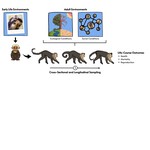 An older male capuchin at Santa Rosa, Costa Rica.
An older male capuchin at Santa Rosa, Costa Rica.Aging
One of my main research interests is why the biological aging process is so variable: why do some individuals retain good health into old age, while others experience steeper physical or cognitive declines and die at younger ages? I have a longstanding interest in bringing together demographic data from different species to situate human life history patterns in broader evolutionary context, and to improve our understanding of the aging process.
My current research on aging in wild capuchin monkeys is funded by a grant from the National Institute on Aging at the National Institutes of Health (1R61AG078529-01).The central aim of the project is to establish a new animal model system for assessing why individuals age at different rates, using the noninvasive long-term study of wild capuchin monkeys in Costa Rica.
This project, for which I am the lead PI, includes key personnel at 6 institutions in the US and Canada. Also working with on this project are:
- PIs
- Fernando Campos (UT San Antonio)
- Kathy Jack (Tulane University)
- Amanda Melin (University of Calgary)
- Co-Investigators
- James Higham (New York University)
- Michael Gurven (UC Santa Barbara)
- Collaborators
- Eva Wikberg (UT San Antonio)
- Joseph Orkin (Université de Montréal)
- Yeonjoo Park (UT San Antonio)
- Consultants
- Noah Snyder-Mackler (Arizona State University)
